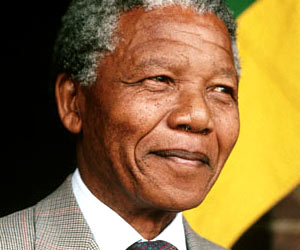Nelson Mandela
“A good head and a good heart are always a formidable combination.”
It was 1990 and Nelson Mandela, prisoner 46664, had just been released from prison on Robbin Island after 27 years. I recall going to see him speak in Piedmont Park with throngs of my fellow Atlantans.
I remember the organizers requested no flash photography be used around him as the retinas of his eyes had been damaged from exposure for so many years to blinding sun reflecting off the white stone in the rock quarries where he was sentenced to hard labor.
He impressed me with his presence so much that I want to honor his passing last week by highlighting just a few of the leadership lessons we can learn from him. Here are the 3 key lessons corporate and organizational leaders can learn from this great man.
These lessons are:
- Great leaders have an inspiring vision that speaks to the highest human values and ideals.
- Great leaders possess large measures self-awareness and humility.
- Great leaders have the mindset and skillset to have powerful, connecting conversations focused on solutions and not personal gain or personalities.
Lesson One: Great leaders have an inspiring vision that speaks to the highest human values and ideals.
The great leaders of the world have one thing in common. They have all fought for a cause with a passion and determination such that they have inspired others to do the same. A great leader inspires a group of people to achieve great things through the power of their vision. From a jail cell, Nelson Mandela inspired people from all over the globe to support the anti-apartheid movement. Better stated, Nelson Mandela stood for equality and inspired others to stand for that too.
His story is remarkable. He was jailed for 27 years in the prime of his life separated from friends and family. He was subjected to hard labor that damaged his health. After these and other injustices, he was still able to NOT bear malice nor want to retaliate against his captors. Instead, he was able to say “As I walked out the door toward the gate that would lead to my freedom, I knew that if I didn’t leave my bitterness and hatred behind, I’d still be in prison.”
How was he able to do this? How was he able to become the President of the country that had imprisoned him and to facilitate truth and reconciliation hearings rather than retaliate?
When he was asked this question, he replied that the man who went to prison never could have become the first democratically elected President of South Africa. Speaking of himself, he said that the man who went to prison was an angry, violent young man who never could have done the things he did for the country.
For months he felt it was all lost. He felt it was all lost and then, like a drop of water on a parched land, the thought occurred to him that maybe, just maybe, his being in prison was at least a part of the end of apartheid. He started to work his way up the ladder of thinking to a higher order of thought where he could see a purpose in his imprisonment.
He asked himself better questions including what if his being in that situation was a part of a larger unfolding for good. If indeed his being in prison was about something much bigger and more impactful, who would he need to be in order to enable that manifestation?
This story leads me to leadership lesson number two.
Lesson Two: Great leaders possess large measures self-awareness and humility.
Two of his famous quotes related to this inner shift are:
“Hope is a powerful weapon, and (one) no one power on earth can deprive you of” AND
“Once a person is determined to help themselves, there is nothing that can stop them.”
This shows his deepening self-awareness and wisdom – the wisdom required of all leaders. He started to gain an understanding of himself, his thoughts, feelings, and the changed conversations that it would require to be the man who facilitated this paradigm shift in the world. His patience, calm confidence, forgiveness, and humor all increased his followership which helped to gain the support to achieve this vision in the world.
Last, but certainly not least, Mandela possessed the head and heart to resist retaliation through escalation.
This brings us to leadership lesson number three.
Lesson Three: Great leaders have the mindset and skillset to have powerful, connecting conversations focused on solutions and not personal gain or personalities.
His ability to remain calm and rational in such extreme situations is something all leaders could learn from. When the black equal rights leader, Chris Hani was assassinated in South Africa, a great anger swept much of the country’s black population who wanted revenge against the racist government. Sensing a potential uprising, Mandela wisely aligned his followers against violence and instead gave a speech which called for a unity of blacks and whites to stand together for peace.
He was also widely known for his ability to listen and to learn. He was famous for being open to new ideas and for showing a willingness to learn from others. These were key factors helping to ensure the success of South Africa following his election to government.
His attitude can be summed up in this quote:
“A good leader can engage in a debate frankly and thoroughly, knowing that at the end he and the other side must be closer, and thus emerge stronger. You don’t have that idea when you are arrogant, superficial and uninformed.”
How else can we learn from his example? Please share your thoughts below! I would like to learn from you.
Laura A. Davis
Phone: 404.327.6330
Email: contact@lauraadavis.com
Website: http://www.lauraadavis.com











